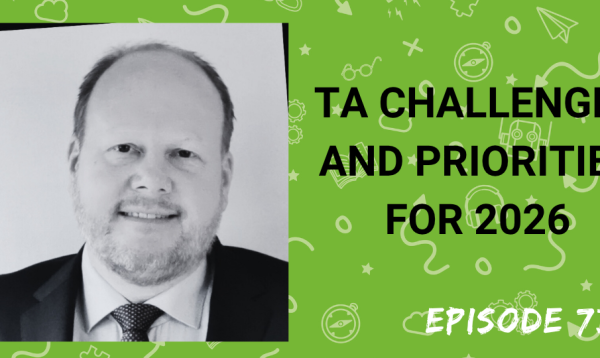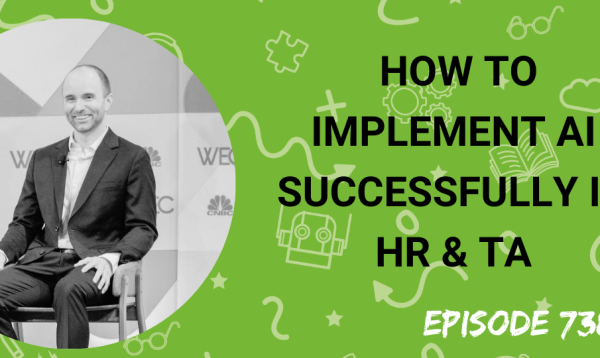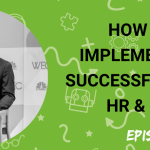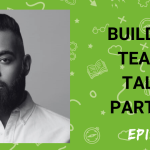With talent acquisition continuously changing and evolving, making sure your recruiters have the right skills is critical for employer hiring success. But what are the skills needed, what should recruiters be doing develop them, and how should their employers be supporting this process?
My guest this week is Rachel Dalboth Strategy and Capability Director for the Forum For In House Recruitment Managers, otherwise known as The Firm. The Firm is a collaborative support community for in house recruiters and has recently done several very interesting research projects around recruiter capability.
In the interview we discuss:
- The FIRM and its work
- The definition of recruiter capability
- The critical skills in house recruiters need in 2019 and how they currently measure up against them.
- When confidence is overconfidence
- Typical areas for development
- How the growth of technology is changing the type of skills which are needed
Rachel also shares what she is seeing the best employers doing to build capability and gives more details on how companies can get involved with The Firm.
Subscribe to this podcast in Apple Podcasts
Transcript:
Matt Alder [00:00:00]:
Support for this podcast comes from Smart Dreamers. Smart Dreamers helps your HR team to accelerate talent acquisition with unique end to end marketing automation software built specifically for recruitment. Companies from L’Oreal and UiPath to Temenos and Jempack use smart dreamers to automate their talent acquisition channels and processes. Their clients are powering talent acquisition at a fraction of the cost and generating employer brand gravity in the process. This means more better candidates and lower cost per hire. No matter what recruitment software you’re using. Smart Dreamers integrates with all of them, a perfect fit for your software ecosystem. If you want more better candidates at a fraction of the cost, visit www.smartdreamers.com. that’s www.smartdreamers.com to learn more and schedule a demo.
Matt Alder [00:01:21]:
Hi everyone, this is Matt Alder. Welcome to episode 198 of the Recruiting Future podcast. With talent acquisition continually changing and evolving, making sure that your recruiters have the right skills is critical for employer hiring success. But what skills are actually needed? What should recruiters be doing to develop them? And how should their employers be supporting this process? My guest this week is Rachel Dalboth, Strategy and capability director for the forum for In House Recruitment Managers, otherwise known as the Firm. The Firm is a collaborative support community for in house recruiters and has recently done several very interesting research projects around recruiter capability. Enjoy the interview.
Matt Alder [00:02:13]:
Hi Rachel and welcome to the podcast.
Rachel Dalboth [00:02:15]:
Thank you so much for having me. Appreciate it.
Matt Alder [00:02:18]:
An absolute pleasure to have you on the show. Could you just introduce yourself and tell everyone what you do?
Rachel Dalboth [00:02:23]:
Yes. So, hi, I’m Rachel Dalboth and I work for the Firm or the forum for In House Recruitment Managers. I work as their strategy and capability director, which pretty much does what it says on the tin, I hope. Yeah, so that’s me really.
Matt Alder [00:02:38]:
So I’m going to ask you to sort of tell us a bit more about the firm and what it does in a second. But before I do, could you sort of just tell everyone a bit about your backstory, how you got to do what you do today?
Rachel Dalboth [00:02:51]:
Sure. Okay. So I’ve been in in house recruitment for over 21 years. I worked out the other day. Terrified me. I’m a bit of a rare breed in some respects. When I speak to people I realize this, which is that I’ve never worked as an agency recruiter. So I haven’t kind of come into in house recruitment that way. The age old story of careers advisors. You know, I wanted to go off and be an actress. Dad said don’t bother doing that, go do something serious. And I ended up somehow HR as work experience and from there that kind of led to recruitment, which I did at Nokia to start with, straight from sixth form actually I worked in the family business for a few years and then joined Unilever. I was actually at Unilever for the last 15 years prior to joining the firm about eight months ago.
Matt Alder [00:03:37]:
So for listeners who might not be familiar with the firm, can you tell us what the firm is and what it does?
Rachel Dalboth [00:03:42]:
Sure. So it’s effectively a membership organisation. So what we do is offer people who work in in house recruitment and talent acquisition, practical, tactical and sort of strategic support to them basically the things they need to do their job and make their life a little bit easier, I guess. So we work off three support, develop and inspire and everything we do we try and make sure that it hangs off of those three things. So it could be events, we have a whole heap of resources and insights for people and also just trying to make those connections for people across the industry. So lots of dialogue here to peer as well. We’ve been in resourcing, all of us actually that work for the organisation pretty much have been in resourcing. The three directors. So Emma, Anna and myself have all been in recruitment for many, many years. Emma and I, former heads of resourcing. Anna was from an agency background. So it’s something we’re really, really passionate about. Having done it, hopefully have some experience to offer people in terms of that support for them.
Matt Alder [00:04:46]:
Now I know that one of the focuses firm has and a particular focus for you is recruiter capability. Could you tell us what you mean by recruiter capability and what’s driving its importance at the moment?
Rachel Dalboth [00:05:00]:
Yeah, so I think recruiter capabilities is probably a snazzy title but in old fashioned language we’re talking about training and development for folks that are doing those roles. So it’s looking at what are the skills and capabilities that they need to have because you know, you’ll know this yourself. It’s evolving all the time in terms of our industry. So there really is different things that they’re having to grapple with every week, whether it’s the change in the way people want to work, the new skills that we’re having to look for. So there’s lots and lots of things that to think about every week and how do we grow and develop within that. It’s something I’ve always felt very passionate about because I’ve done it myself, because I’ve led teams doing those roles. And I guess it’s a bit of an age old HR thing, but we’re a bit like cobbler’s children. Right? You’ve heard that saying in terms of we think about everybody else’s development in hr, but not necessarily our own. So that’s something that I feel really strongly about in terms of how we can support other recruiters with their development.
Matt Alder [00:06:04]:
I know the firm do a lot of research into this area so you can support your members. What are the key skills that in house recruiters currently need and how are people kind of measuring up in terms of having those skills?
Rachel Dalboth [00:06:18]:
Yes, we do a lot of research. One of the last bits of research that we conducted was around this very topic. So it’s really interesting actually. I mean, according to recruiters themselves, the top four are things like understanding hiring manager requirements, sourcing candidate engagement and employer branding or evp. So the kind of fundamentals you’d expect to see, I guess, but interesting that aligns with what we see contextually as well. So if you think about the competition for talent and skills at the moment, we’ve got to get there sooner. So understanding what’s needed by the business, having an understanding of those hiring manager requirements up front is absolutely relevant and critical. If you think about unemployment at the moment, you know, we’ve got the lowest unemployment that we’ve had for decades. 1975, I think. So again, there’s less active, more passive candidates, which makes sourcing so much more critical. Consumer expectations. I mean, I’m sure you’re similar to me, Matt, in that, you know, the way in which we expect things now as consumers, it’s slick, it’s quick. Now I can go on Amazon and buy a pair of shoes and have it on my doorstep, you know, the following morning, much to my husband’s distaste. But you know, consumer expectations are filtering into the way that candidates want to be treated. So if you think about things like candidate engagement and employer branding really relevant. So that certainly mimics what recruiters say and then even things down to the way that people want to work the gig economy, next gen work. There’s a different conversation that in house recruiters are having to have with candidates. Now it’s not just about chucking money at them. You asked how people are faring up against some of those things because they might be the priorities. What’s interesting is recruiters seem to have a built in confidence about their own capability. So, you know, if you look at sourcing, if you look at candidate engagement, over 80% of us think that we’re really great at that stuff. Little bit low for things like eb, but even still, we seem to have an innate confidence in our ability around those things. But we get some clues around the opportunity to develop when we look at some of the other research that we’ve done or other people have done. So, for example, we think we’re great at sourcing. But when you look at what recruiters say about their organisation’s approach to workforce planning or strategic resource demand, people are suggesting that they’re probably only around the evolving mark and in one in 10 cases, it’s not happening at all. So what does that say about our true ability to do things like proactive or strategic sourcing? I would suggest you can’t do those things really, really well unless you’ve got the kind of strategic workforce planning behind it. Also things like how we rate our own ability around talent advisory skills, again, to better do those things really proactively and strategically. Recruiters are saying they don’t feel confident in some of that stuff. And actually that’s fundamental in terms of being able to do really great sourcing and recruiting. So I think there’s some interesting areas for development, which is not a negative comment at all. I think it’s great for us to be able to have that focus when we are all so busy. We’ve got so many things to grapple with.
Matt Alder [00:09:40]:
How is the sort of surge of recruiting technology affecting the balance of skills that recruiters need?
Rachel Dalboth [00:09:48]:
God, that’s a good question and it’s an interesting one. I’ve probably got more than one answer, which I’m not sure is helpful. But anyway, I mean, I think the first thing is that there’s this whole fear, isn’t there, about robots are coming to take our jobs. I hear this week in, week out, I felt it myself. My view is that robots will only take the bits of our jobs that we let them. So we have a really fabulous USP in terms of the fact that we have skills that robots can’t overtake. So digital is not going to replace everything. When you think about our ability to do critical thinking or empathise, all the things that are actually really, really important in the candidate experience, which we know is a high priority. So I think it’s about making sure that we remain relevant alongside some of those digital solutions and things like AI. So how do we then use that space that’s being freed up for us by some of that automation to actually have better, more human interactions with candidates that make that candidate experience even better? I mean, I can’t count the amount of times that I or my team in the past, what I want more time to be able to do. So actually, I think this is potentially a very positive thing that we’re going to be freed up to do more of that stuff. What we need to make sure is that we’re comfortable with that we need to get comfy with around digital is just the speed at which it’s happening. I mean, there’s been some, you know, amazing quotes out there about technology speed, but, you know, when we look at just the sheer number of solutions available in the recruitment industry, it’s quite terrifying. Actually. There’s a brilliant one around. It took 68 years to have 50 million people flying on planes and 19 days, 50 million users to play Pokemon Go. So there’s something about the fact that we are comfortable to adopt technology, but we do need to get comfortable with the speed at which it’s coming at us.
Matt Alder [00:11:43]:
That’s a really interesting point about the speed at which technology is developing and I suppose the sheer noise in the market coming from the software providers. How are you finding your members coping with that? How are they sort of getting their information? What could the software industry be doing differently to sort of to help them with that education and adoption?
Rachel Dalboth [00:12:06]:
I think that’s a really good question. So for me, you can’t possibly now, as a recruiter, expect to know all of those tech solutions inside out because there’s just so many of them. So I actually think it comes back to this capability piece again and perhaps the software companies being able to support that, which is around giving people the skills and the confidence to be able to do their sort of due diligence around some of that. So going back to understanding what you want that tech to do and having a very, very clear objective, a brief on that for your organization and your team that allows you to go and say, what is it that I need? What is going to be the best solution for me in that respect and be able to do a scan of what is an incredible noisy market at the moment. So, you know, if there’s a way of software providers helping with some of those skills and giving people the, you know, the understanding of how to do that, due diligence, I think that would be really helpful, actually how we do that. Not got the answer. But I do think when we look at some of the soft skills that recruiters are needing, and that’s being called out a lot by the way, over technical recruitment skills, in many cases it’s things like being able to do your due diligence against tech, for example.
Matt Alder [00:13:23]:
So the employers that you work with, what are they doing at a corporate or organizational level to help build capability within their recruitment teams?
Rachel Dalboth [00:13:33]:
Well, we work with a variety of different organizations, right? From some very small ones right up to very large corporates. And I think they’re all doing brilliant things and very different things. The ones that I see doing things particularly well, they’re not necessarily always the big ones, by the way. I think that’s important to call out. First and foremost. They have recruiter capability on their agenda. You know, they know it’s not just nice to have if they want to remain competitive. Because unless you’re saying that resourcing is important and unless you’re putting some funding behind that and some effort behind that, it doesn’t really mean anything. So if you look at an organization, no one’s going to stop training their salespeople. We’re saying that this, you know, in terms of having top talent should be on the agenda. Well then so should resourcing capability and so should recruiter capability. A lot of them are starting to take an academy style approach. So actually having almost like the mini sales and training, sorry, learning and development team integrated within resourcing, so perhaps regionally or globally, so having that kind of academy approach, having something that’s dedicated. The other ones that I see doing great stuff are looking outside of recruitment in their organisation. So they’re leveraging expertise across the organisation. They’re looking to their marketing teams, for example, or they’re looking to their sales teams and saying, well, how can we adopt some of the skills that you use in a resourcing sense? And then I guess just sticking your head above the parapet sometimes, look outside, look at what other people are doing, look at what your peers are doing. Very easy when you’re busy to become insular and just think about your organisation. But actually, you know, coming to events, talking to people online in some of the forums that we have, really looking at case studies and best practices and saying, what else can I bring back into my organisation from the outside world? I think those things are really important.
Matt Alder [00:15:33]:
Final question, how can people find out more about the firm and get involved?
Rachel Dalboth [00:15:38]:
Well, of course, so we have a fabulous LinkedIn group. It’s where we see started actually, and that’s still going strong. So if you aren’t already a member of that, then do join the LinkedIn group because you know that’s free. You can come and just have fabulous conversations with your peers, have a rant, get solutions share ideas, whatever works for you. Come to the website www.thefirm-network.com drop us an email Drop me an email. Find us on LinkedIn. Obviously, as individuals, if you want to, we’ve got events, they’re fairly regular up and down the country. We’d love to see at one of those and you’re very welcome to come, even as non members. The other thing I would really recommend is think about joining and entering the awards because there’s so much great work going on, Matt. We see it year in year eight and get blown away by some of the work that’s being done in the industry. So, you know, give yourselves credit for that. Think about entering the awards as well.
Matt Alder [00:16:34]:
Rachel, thank you very much for talking to me.
Rachel Dalboth [00:16:36]:
Thank you for having me. Appreciate it.
Matt Alder [00:16:38]:
My thanks to Rachel Dalboff. You can subscribe to this podcast in Apple Podcasts or via your podcasting app of choice. The show also has its own dedicated app which you can find by searching for Recruiting Future in your App Store. If you’re a Spotify user, you can also find the show there. You can find all the past episodes@www.rfpodcast.com on that site you can subscribe to the mailing list and find out more about working with me. Thanks very much for listening. I’ll be back next week and I hope you’ll join me.








